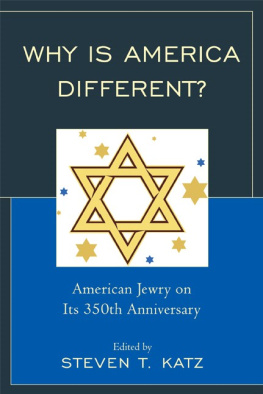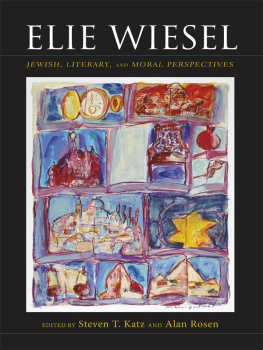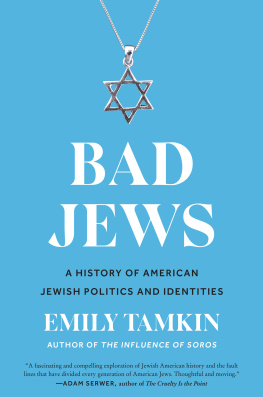1
Enlightenment, Statesmen and the Jews in Europe and the United States, 17761820
Allan Arkush
There has been a great deal of scholarly work in recent years on the European Enlightenment and the Jews. European, American and Israeli historians have shed much new light on a whole variety of subjects, including the attitudes of Enlightenment thinkers toward the Jews and Judaism, the influence of the Enlightenment on the attitudes of European statesmen toward the Jews, the relationship between the Enlightenment in general and the Haskalah (its Jewish branch), and the character of the Haskalah in places other than Central Europe, such as Italy and England.1 If there has been no comparable efflorescence of scholarship on the American Enlightenment and the Jews, one ought not to be surprised. Eighteenth-century American thinkers and statesmen showed much less interest in the Jews than many of their European counterparts. And there was no significant American Jewish literary activity whatsoever prior to 1820, indeed scarcely any noteworthy writings at all by American Jews. This can no doubt be explained, for the most part, by the very small size of the American Jewish community at the time. But the easier it is to account for the lack of early American concern with the Jewish problem, the harder it is to justify any comparison of the situation in Europe and America during the late eighteenth and early nineteenth centuries.
It is doubtful that anyone would even think of making such a comparison were it not for the subsequent emergence in the United States of the Diasporas largest, most prosperous, and most successfully integrated Jewish community. American Jewrys later achievements retroactively render its rather paltry beginnings vastly more interesting than they would have been if they had led to less impressive results. It is hard not to look at them and ask whether there was not, from the very beginning, something different about this country, something that made it a much more hospitable setting for Jewish life than modern Europe.
I have never given any careful thought to this question, prior to the preparation of this paper. My own academic work has focused to some extent, however, on the ways in which thinkers of the European Enlightenment and late eighteenth-century European statesmen influenced by them regarded and treated the Jews. Whether I can draw upon this research in ways that might illuminate the rather different American experience is something that I will have to leave it to the reader to judge.
If one had to summarize the attitude of the European Enlightenment toward the Jews while standing on one foot, the best way to do so, in my opinion, would be to point to the Enlightenments acknowledgement that the Jew is even more man than Jew. I have taken these words from the famous, epoch-making treatise by the Prussian official Christian Wilhelm von Dohm, On the Improvement of the Civic Status of the Jews, but they epitomize, I believe, the basic standpoint from which virtually all of the Enlightenment thinkers regarded the Jewish people.2 In their eyes, Jews were at bottom human beings different in no essential respect from other human beings and fully deserving of recognition as such. This did not necessarily mean that they were worthy of receiving completely equal rights immediately, but only that they were potentially capable of full participation in societywithout first having to cease to be Jews and become Christians. It might be necessary, as Dohm himself believed, for governments to wait for the Jews to improve themselves before placing them on precisely the same plane as their gentile fellow citizens.3
What I have said so far might seem to amount to an unduly benign characterization of the fundamental stance of the European Enlightenment toward the Jews. One could accuse me of overlooking the unsavory side, the ways in which the Enlightenment revived older, pre-Christian strands of anti-Semitism and continued to reflect longstanding Christian antipathy toward the Jews and Judaism. Everyone conversant with this subject is undoubtedly familiar with Arthur Hertzbergs identification of Voltaire as the major link in Western intellectual history between the anti-Semitism of classic paganism and the modern age and his description of him as someone who ruled the Jew to be outside society and hopelessly alien even to the future age of enlightened men.4 And, in the nearly forty years that have passed since Hertzberg wrote these words, quite a few other scholars have sought to show how intolerant many Enlightenment thinkers were of Jewish otherness.
I would not deny that Voltaires writings were full of what George Eliot called anti-Jewish fulminations. Yet Hertzbergs highly influential reading of his work is, in my opinion, deeply flawed.5 I cannot take the time here to review all of its questionable aspects, but I would like to point to the more balanced portrayal of Voltaire in Ronald Schechters recent book, Obstinate Hebrews. Schechter shows how Voltaire concluded that there was living proof that Jews, like other people, could cast off their superstitions and depart radically from the condition of their contemporaries and their fore-bears.6 There was, for Voltaire, no denying that a Jew could become a phi-losophe. Voltaire, to be sure, as well as many others, believed that the process of becoming one involved the sloughing off of the Jewish religion (which they regarded as a set of pernicious superstitions). But the very fact that they believed Jews to be capable of such a move demonstrates how much they were in agreement with Dohm, and with what I consider a fundamental tenet of the Enlightenment, that the Jew is even more man than Jew. For all of them, becoming a better man definitely entailed becoming less of a Jew, but it did not necessitate ceasing altogether to be a Jew and becoming a Christian. Of course, they did not believe that there was any harm, either, in the abandonment of Jewishness. For Dohm, in particular, a man who has gone down in history as a great friend of the Jews, it apparently made no difference whether the descendants of the people he was attempting to liberate became less Jewish or, in the end, non-Jewish. What was important was that they improve themselves in the truly decisive respects.
This new attitude toward the Jews would have a major impact on the lives of most of them only after it passed beyond the confines of intellectual circles and began to inform the policies of European statesmen toward the Jewish inhabitants of their countries. In the continental autocracies, this process occurred somewhat slowly and unevenly. Not every crowned devotee of the Enlightenment became a benefactor of the Jews. Frederick the Great of Prussia, a friend of Voltaire (at least for a time), Maupertuis, and other avatars of the Enlightenment, developed no new appreciation of the Jews capacities and in no way altered Prussias oppressive policies toward them. Another friend of Voltaires, Catherine the Great of Russia, did make an effort to expand the opportunities open to her Jewish subjects, but retreated quickly in the face of internal opposition.7 Of the eighteenth-century European monarchs influenced by the Enlightenment only Joseph II of Austria took significant steps to reduce the disabilities under which the Jews labored and to integrate them, with some measure of coercion, into the general society.
The impact of Enlightenment ideas on state policies toward the Jews was, of course, much more abrupt and much greater in France. The ministers of Louis XVI had indeed toyed with the idea of improving the Jews situation, but the French National Assembly, after some initial hesitation, went far beyond anything that had previously been contemplated in the halls of power and granted all the Jews of France fully equal rights. That this measure was the product of Enlightenment thinking scarcely needs to be underlined. But this does not mean that all subsequent efforts to curtail the rights of French Jews constituted a reaction against the ideas of the Enlightenment. When Napoleon Bonaparte promulgated special, discriminatory legislation to regulate Jewish affairs in the first decade of the nineteenth century, he stood squarely within the earlier, tutelary tradition of the Enlightenment. Napoleons plans for the reorganization of French Jewish life and even his infamous decrees were designed, after all, not to exclude the Jews from society but mostly to facilitate their acculturation and assimilation.








